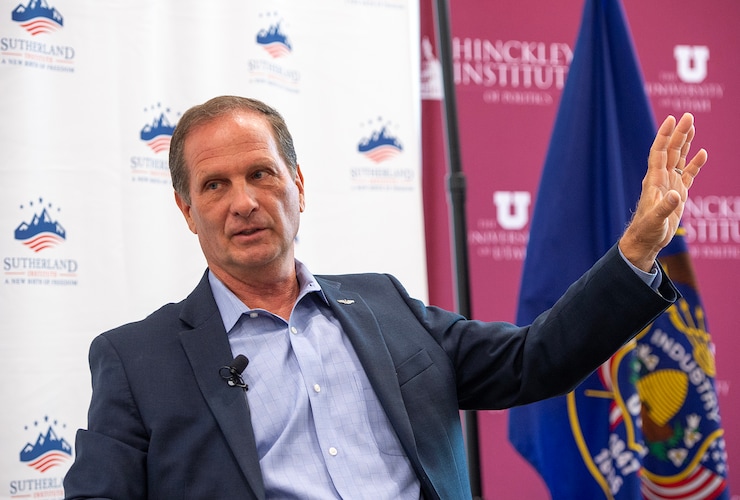Rep. Chris Stewart, wrapping up his final weeks in Congress after serving for just over a decade, told an audience at the University of Utah on Thursday that regardless of how fractured the country is, America can find a way to get past its most divisive issues if it looks to the country’s founders.
The questions that those debates are going to answer — like how to define gender, or what freedoms people are willing to give up in order to protect religious liberty — will “define this entire nation,” he said during a conversation with Sutherland Institute President Rick Larsen. Solving them will take some difficult conversations, Stewart added, pointing to the way the U.S. has taken on polarizing matters before.
“Here’s a good example,” he said. “How do you compromise on whether an African American slave is a person? Right? That’s a hard thing to have a conversation about, but our Founding Fathers had to do that, and they found a way to do it. They didn’t find the solution, but they found a way to get to the solution in the near future.”
The U.S. Constitution was initially drafted to count slaves as three-fifths of a person in determining representation in Congress, the number of electoral votes each state would receive and how much states would pay in taxes. After the Civil War — another example Stewart gave of a conflict in which the country ended up coming together — the compromise was repealed as the 14th Amendment was adopted.

(Chris Samuels | The Salt Lake Tribune) U.S. Rep. Chris Stewart, R-Utah, speaks at an event for the Sutherland Institute at the University of Utah, Thursday, Aug. 3, 2023.
Part of whats moved Congress into its ruptured state are influential “voices on both extremes,” mentioning the conservative House Freedom Caucus and its progressive counterparts across the aisle. That caucus doesn’t publish its membership, but none of Utah’s four Republican congressmen have identified themselves as members.
Stewart aligned with his Republican colleagues in the Freedom Caucus on a number of issues, including in voting against articles of impeachment against former President Donald Trump — both times they were invoked — and in many of them refusing to certify President Joe Biden’s 2020 victory.
That division is performative to an extent, Stewart said, which, he added, “shows you that there’s not a lot of honesty in our public discourse.”
He shared memories of his time on the House Appropriations Committee, saying the group often had debates lasting over 12 hours that would probably lead people to think “we’re ready to go to war with one another.” That, however, doesn’t reflect their personal relationships, Stewart said.
“At the end of the day, Congress reflects Americans,” Stewart said, and that’s what worries him.
The bitter partisan rhetoric has “gone beyond just the body politic ... to the point where people appear to be self-sorting,” Stewart noted, pointing to Americans moving from state to state to live in a place where they are governed by people who share their world view.
How might individual citizens work toward reducing division? Voting, Stewart said, and by strengthening families. He is leaving Congress to help take care of his wife after she had a stroke about a year ago, and he said prioritizing his family is something he would like to be known for.
“When we say we put family first, only a couple of times in our lives is that tested,” Stewart said.
Utah voters will elect Stewart’s replacement during a special congressional election this fall.
Despite much of the conversation being focused on the growing divide in the U.S., the outgoing congressman said he has hope for the future “because God cares about this country.”
“We are the glue that holds the world together,” he said. “If the United States stumbles, the world crumbles underneath us.”








